英语词汇学--词义的变化共123页文档
- 格式:ppt
- 大小:9.43 MB
- 文档页数:123

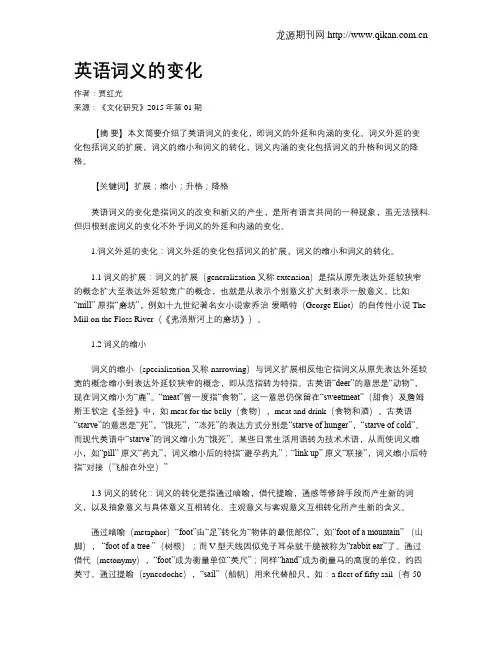
英语词义的变化作者:贾红光来源:《文化研究》2015年第01期【摘要】本文简要介绍了英语词义的变化,即词义的外延和内涵的变化。
词义外延的变化包括词义的扩展,词义的缩小和词义的转化,词义内涵的变化包括词义的升格和词义的降格。
【关键词】扩展;缩小;升格;降格英语词义的变化是指词义的改变和新义的产生,是所有语言共同的一种现象,虽无法预料.但归根到底词义的变化不外乎词义的外延和内涵的变化。
1.词义外延的变化:词义外延的变化包括词义的扩展,词义的缩小和词义的转化。
1.1词义的扩展:词义的扩展(generalization又称extension)是指从原先表达外延较狭窄的概念扩大至表达外延较宽广的概念,也就是从表示个别意义扩大到表示一般意义。
比如“mill” 原指“磨坊”,例如十九世纪著名女小说家乔治·爱略特(George Eliot)的自传性小说The Mill on the Floss River(《弗洛斯河上的磨坊》)。
1.2词义的缩小词义的缩小(specialization又称narrowing)与词义扩展相反他它指词义从原先表达外延较宽的概念缩小到表达外延较狭窄的概念,即从范指转为特指。
古英语“deer”的意思是“动物”,现在词义缩小为“鹿”。
“meat”曾一度指“食物”,这一意思仍保留在“sweetmeat”(甜食)及詹姆斯王钦定《圣经》中,如meat for the belly(食物),meat and drink(食物和酒)。
古英语“starve”的意思是“死”,“饿死”,“冻死”的表达方式分别是“starve of hunger”,“starve of cold”。
而现代英语中“starve”的词义缩小为“饿死”。
某些日常生活用语转为技术术语,从而使词义缩小,如“pill” 原义“药丸”,词义缩小后的特指“避孕药丸”;“link up” 原义“联接”,词义缩小后特指“对接(飞船在外空)”1.3 词义的转化:词义的转化是指通过暗喻,借代提喻,通感等修辞手段而产生新的词义,以及抽象意义与具体意义互相转化、主观意义与客观意义互相转化所产生新的含义。

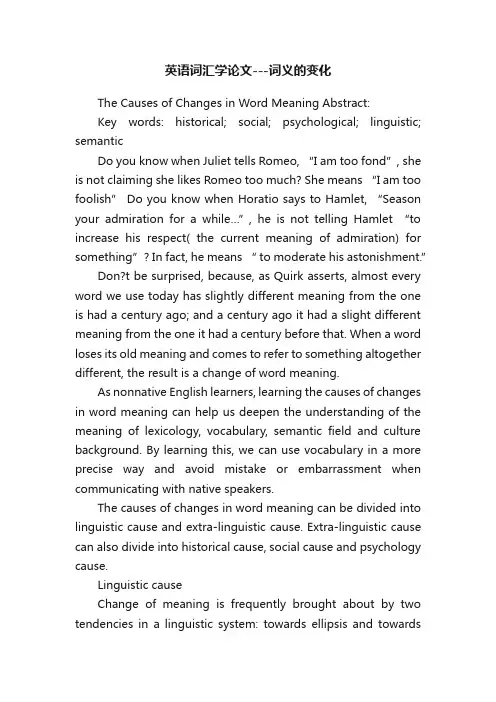
英语词汇学论文---词义的变化The Causes of Changes in Word Meaning Abstract:Key words: historical; social; psychological; linguistic; semanticDo you know when Juliet tells Romeo, “I am too fond”, she is not claiming she likes Romeo too much? She means “I am too foolish” Do you know when Horatio says to Hamlet, “Season your admiration for a while…”, he is not telling Hamlet “to increase his respect( the current meaning of admiration) for something”?In fact, he means “ to moderate his astonishment.”Don?t be surprised, because, as Quirk asserts, almost every word we use today has slightly different meaning from the one is had a century ago; and a century ago it had a slight different meaning from the one it had a century before that. When a word loses its old meaning and comes to refer to something altogether different, the result is a change of word meaning.As nonnative English learners, learning the causes of changes in word meaning can help us deepen the understanding of the meaning of lexicology, vocabulary, semantic field and culture background. By learning this, we can use vocabulary in a more precise way and avoid mistake or embarrassment when communicating with native speakers.The causes of changes in word meaning can be divided into linguistic cause and extra-linguistic cause. Extra-linguistic cause can also divide into historical cause, social cause and psychology cause.Linguistic causeChange of meaning is frequently brought about by two tendencies in a linguistic system: towards ellipsis and towardsanalogy. Some linguists think foreign influence should subordinate linguistic cause.Ellipsis occurs when a phrase is shortened to one word which retains the meaning of the whole, so it often occurs in habitual collocations, such as adjective + noun or attributive noun + noun. Private, daily, duplicate are all adjectives, but they are used as nouns. Private means a soldier of the lowest rank, daily means daily newspaper, and duplicate means duplicate copy. Under such circumstances, whatever is left, whether a noun or an adjective, is all used as a noun assuming the original meaning. Naturally, the association became so close that the first element could alone carry the meaning of the whole phrase.Besides, there is a change of grammatical function as well, as when adjectives assumethe roles of nouns. Unlike the above examples, whose sense of one word has been transferred to another simple because the two occur together habitually, in some cases, it is the second or “headword”of the phrase that remains. For example, (stream) engine, (coal) gas and (light) bulb.The analogical tendency means new meanings developed in one part of speech are passed on to other parts of speech from the same lexical bas e. Fortuitous formerly denoted …happening by chance?, …accidental?, and later took on the meaning …fortunate?probably by analogy because the two words look similar in shape. Another interesting example is fruition, originally from a Latin word fruitio meaning enjoyment. But now, its meaning is given as “fulfillment of (plans, desired results, aims, etc.),”possibly from connection with the word fruit.Foreign influencesA particularly important cause of change of meaning inwords has been the influence of foreign words. For example, the native word stool originally meant any kind of seat for one person, and could even be used for a king?s seat. It got its humble meaning because the French word chair was adopted to denote a more comfortable piece of furniture. Other example is dream. Dream meant “joy” in OE; it gets its modern sense from the related Scandinavian word draumr.Historical causeIt often happens that though a word retains its original form, its meaning has changed because the object which it denotes has changed. This is the historical cause of semantic change.The well-known semanticist Ullmann notes, “It often happens that language is more conservative than civilization, material as well as moral. Objects, institutions, ideas, scientific concepts change in the course of time; yet in many cases the name is retained and thus helps to ensure a sense of tradition and continuity.”(Ullmann 1997:198)Indeed, it often happens that a word is retained for a name though the meaning has changed because the referent has changed. Take pen for example, it donated …feather?, which was used in the West as pen in old times. Now, the time when …feather? served as pen is long gone, and people are using hall-point pens and fountain pens, yet the name is still kept. This change has also occurred to computer, which designated a …person who computes? in the past. At present, when we talk about computer, people, people would think of an …electronic machine? rather than a person.There are also many scientific concepts which have retained their original forms, although their meanings have changed as a result of new scientific discoveries and increased knowledge. Forinstance, before Copernicus, the sun was thought to be …the luminous celestial body that in the Plolemaic system is one of the seven planets revolving around the earth? and this meaning is retained in “The sun rises and sets.”The Copernician theory tried to change the historical point of view and now everyone knows that the sun is a …star around which the earth a nd other planets revolve…?Social causeWe are going to discuss social cause of the changes of words?meanings in five aspects.A. Social developmentChange in word meaning resulting from a constant verbal traffic between common word and various technical words is referred to as social cause of semantic change. (Ullmann 1997:199-200) As a result, some technical words have lost their specialized meanings and have come to be used in more general senses, which connect with electricity, physics, chemistry, medicine, mathematics, etc. For instance, feedback means “response” in common use, as in “The teacher likes to have feedback from his students.”Dimension: as a common word, it means “extent in a particular aspect”, as in “This problem has a new dimension.”B. Social environmentBig events in society will change the meaning of some words. The simple words cold and hot have changed their meanings in the field of politics, as in “cold war” and “hot war”. In England, Abdication can mean King Edward VIII abdicated for marrying a divorced American woman, Ms Simpson. In these cases, nonnative speakers should try to memorize.C. Social classVillain means bad people, but its original meaning is villager.Because the aristocrat looks down upon the low social status villagers, the meaning of villain changed. It is a kind of degeneration of meaning. More examples are clown, boor, knave, and churl. Thus, if a word has something to do with low social status, it will have derogatory sense, vice versa.D National sentimentNational sentiment influences the meaning of word deeply. In English, some bad things will have connection with other nations. For instance, to take French leave means leaving without saying goodbye. Italian hand means interfere. Spanish athlete means a person who says nonsense.The most obvious nation, to which English shows great prejudice, is Netherlands, because these two countries always fought each other in 17century. Dutch act means commit suicide. Dutch comfort means comfort of no help. Dutch widow means prostitute. Dutch uncle means strict critic. Dutch treat means a party that you should pay for yourself. Dutch bargain means a deal made when you are drunk. I amDutched means I am cheated. Double Dutch means words that are rather baffling. I’m a Dutch man if …E. SexismThere are some words with sexism in English, but the number is minor. For example, “Man is a rational animal; men are born equal.”The man in there refers to human being. Recent years, thanks to feminist movement, more and more words are created to refer to women, such as businessperson, draftsperson, poetess, heroine, spokeswoman etc.Psychological causePsychological cause is also constantly at work in bringing about changes in word meaning. Psychological factors play abasic part in meaning change, which leads to the elevation or degradation of word meanings. It takes three forms: euphemism, grandiloquence and cynicism.A.EuphemismPeople change word-meaning owing to various psychological motives: love, respect, courtesy, suspicion, pessimism, irony, contempt, hatred, etc. People tend to use mild, agreeable language when speaking of an unpleasant or embarrassing fact and taboo subjects.Death and things related to death are one of the most common objects of euphemism. “To pass away,”“to brea the one?s last,”“to cease to think,”“to fall asleep,”“to kick the bucket,”“to be no more,”“to go west,” all refer to death.Toilet is another example. Rest room, lounge, convenience, comfort station and powder room are just some of its euphemism. Pregnant can be said “big,”“big with child,”“expectant,”“heavy with child,”“laden,”“anticipating,”“in the family way,”and “in an interesting condition.”B.GrandiloquenceGrandiloquence refers to the use of long, important-sounding words for effect. The desire to upgrade or raise the social status of a position, occupation, or institution by changing its common name to one felt to confer greater dignity or importance is another psychological factor in the change of word meaning.In American English, there are so many words of grandiloquence used in unpopular jobs. Garbage collector is sanitation engineer, servant is domestic engineer, mortician is funeral director and gardener is landscape architect.In a sense, grandiloquence is a form of euphemism, too. So some linguists consider grandiloquence subordinate the Euphemism.C.CynicismCynicism is the desire to sneer and to be sarcastic. For instance, the word pious may mean “hypocritically virtuous” in addition to its primary meaning, “having, showing deep devotion to religion.” The present meaning of sanctimonious is “pretending to be very holy or pious”, while it once meant “devout, holy or sacred”. Fanatic, a Latin synonym for enthusiastic, means “unreasonably enthusiastic, almost approaching to madness.”ConclusionChange in word meaning is commonplace and fundamental in a living language, for it is one of the simplest and most convenient ways of meeting peoples? need for new manes to refer to new things, ideas, processes, etc. Broadly speaking, change of meaning refers to the alteration of the meaning of existing words, as well as the addiction of new meaning to established words.The causes of semantic change are historical, social, psychological or purely linguistic. As nonnative English learners, we need to pay more attention to the changes of word meanings, for we are not familiar with their own history, their culture background and psychological situation. Only by learning these causes can we get a better understanding of lexicology, vocabulary, semantic field and context. Only by learning these causes can we know which words should be used and which words should be avoided, so that we can express our meaning more specific in communication with others.Bibliography:Jackson Howard (2000), Words, Meaning and V ocabulary, Trowbridge: The Cromwell PressJavier E Diaz Verd (2004), Lexicography, Semantics and Lexicology in English Historical Linguistics, Netherlands: Rodopi 汪榕培(2000),《英语词汇学研究》,上海:上海外语教育出版社汪榕培& 卢晓娟(2006),《英语词汇学教程》,上海:上海外语教育出版社杨艳华& 张树凡(2007),《现代英语词汇学》,:冶金工业出版社张维友(1997),《英语词汇学教程》,武汉:华中师范大学出版社张韵斐(2012),《现代英语词汇学概论》,北京:北京师范大学出版社。


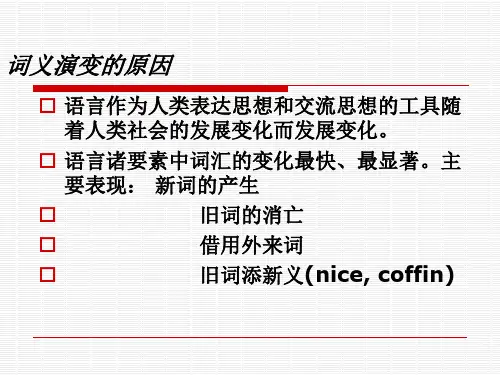
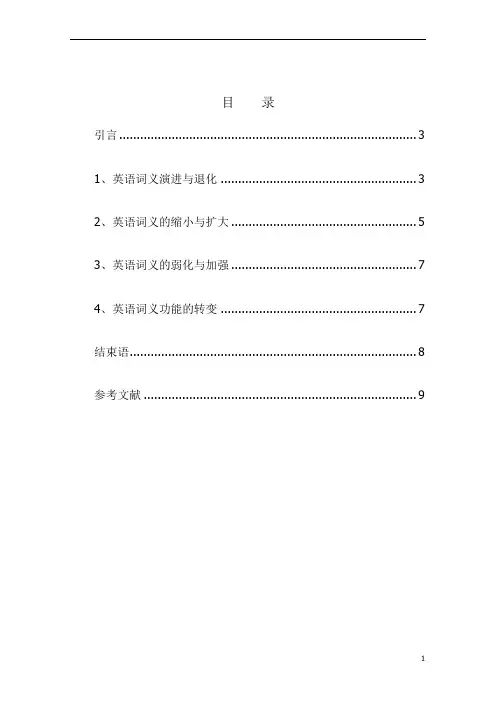
目录引言 (3)1、英语词义演进与退化 (3)2、英语词义的缩小与扩大 (5)3、英语词义的弱化与加强 (7)4、英语词义功能的转变 (7)结束语 (8)参考文献 (9)英语词义的变化摘要:语言作为人类交流思想和传递信息的工具,总是随着人类社会的进步而发生着变化。
英语作为一种语言,已经有1500年的历史,其变化巨大也是可想而知的。
英语词义的变化主要表现在词义的演进与退化、词义的缩小与扩大、词义的弱化与加强以及词义功能的转变等方面【1】。
关键词:英语;词义;变化The changes of lexical meanings of English wordsAbstract: The language as tools of human thought and communicate information, is always changing with the progress of humansociety. English as a language, having1500 years of history,the change is palpable. English word meaning changes in wordmeaning evolution and degeneration, narrowing of the meaningand expand, the weakening and strengthening as well as themeaning of the word function transformation, etc.Key word:English;meaning;change引言随着社会的发展,时代的变迁,英语像汉语一样,一些新词出现,旧词消失,一些词义退化演进,词义的功能也在发生转变。
词义的变化从时间上可以分为文艺复兴时期、资产阶级革命时期、殖民地开拓时期【2】。
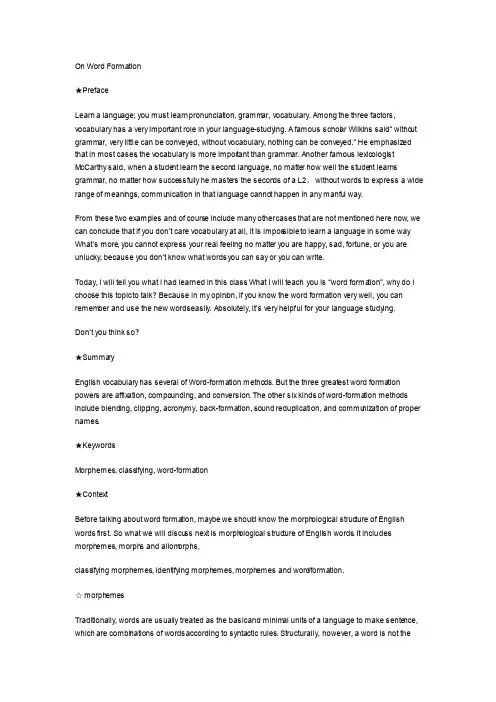
On Word Format ion★Prefac eLearna langua ge; you must learnpronun ciati on, gramma r, vocabu lary. Amongthe threefactor s,vocabu laryhas a very import ant role in your langua ge-studyi ng. A famous schola r Wilkin ssaid”withou t gramma r, very little can be convey ed, withou t vocabu lary, nothin g can be convey ed.”Heemphas izedthat in most cases, the vocabu laryis more import ant than gramma r. Anothe r famous lexico logis tMcCart hy said, when a studen t learnthe second langua ge, no matter how well the studen t learns gramma r, no matter how succes sfull y he master s the second s of a L2, withou t wordsto expres s a wide rangeof meanin gs, commun icati on in that langua ge cannot happen in any manful way.From thesetwo exampl es and of course includ e many othercasesthat are not mentio ned here now, we can conclu dethatifyoudon‟tcarevocabu laryat all, it is imposs ibleto learna langua ge in some way. What‟smore, you cannot expres s your real feelin g no matter you are happy, sad, fortun e, or you are unluck y, becaus eyoudon‟tknowwhatwordsyou can say or you can write.Today, I will tell you what I had learne d in this class. What I will teachyouis“wordformat ion”,whydoIchoose this topicto talk? Becaus e in my opinio n, if you know the word format ion very well, you can rememb er and use the new wordseasily. Absolu tely,it‟sveryhelpfu l for your langua ge studyi ng.Don‟tyouthinkso?★Summar yEnglis h vocabu laryhas severa l of Word-format ion method s. But the threegreate st word format ion powers are affixa tion, compou nding, and conver sion. The othersix kindsof word-format ion method s includ e blendi ng, clippi ng, acrony my, back-format ion, soundredupl icati on, and commun izati on of proper names.★Keywor dsMorphe mes, classi fying, word-format ion★Contex tBefore talkin g aboutword format ion, maybewe should know the morpho logic al struct ure of Englis h wordsfirst. So what we will discus s next is morpho logic al struct ure of Englis h words. It includ esmorphe mes, morphs and allomo rphs,classi fying morphe mes, identi fying morphe mes, morphe mes and word-format ion.☆ morphe mesTradit ional ly, wordsare usuall y treate d as the basicand minima l unitsof a langua ge to make senten ce, whichare combin ation s of wordsaccord ing to syntac tic rules. Struct urall y, howeve r, a word is not thesmalle st unit becaus e many wordscan be separa ted into even smalle r meanin gfulunits. Theseminima l meanin gfulunitsare knownas morphe mes. In view of word-format ion, the morphe meisseenas…thesmalle st functi oning unit in the compos ition of words‟. Syntac tical ly, howeve r, a morphe me is the minima l form of gramma tical analys is.Morphe mes are abstra ct units, whichare realiz ed in speech by discre te unitsknownas morphs. They are actual spoken, minima l carrie rs of meanin g.Morphe mes vary in functi on. Accord ingly, we can classi fy morphe mes into severa l genera l catego ries:① Free versus BoundMorphe mes ---- morphe mes whichare indepe ndent of othermorphe mes are free. Thesemorphe mes have comple te meanin gs in themse lvesand can be used as free gramma tical unitsin senten ces. Morphe mes whichcannot occuras separa te wordsare bound. They are so namedbecaus e they are boundto othermorphe mes to form wordsor to perfor m a partic ulargramma tical functi on.② Deriva tiona l versus Inflec tiona l Morphe mes ---- morphe mes whichare used to derive new wordsare knownas deriva tiona l morphe mes becaus e when thesemorphe mes are conjoi ned, new wordsare derive d.③ Conten t versus Gramma tical Morphe mes ---- On a semant ic and syntac tic basis, morphe mes can fall into conten t and gramma tical morphe mes. Conten t morphe mes are lexica l morphe mes whichare used as we see aboveto derive new words, so also knownas deriva tiona l morphe mes.☆ Morphe mes and Word-format ionWe know that wordscan be analyz ed into morphe mes, whichare the minima l meanin gfulunitsin the compos ition of words. In word-format ion format ion, howeve r, morphe mes are conven tiona lly labele d root, stem, base and affix.Affixe s are formsthat are attach ed to wordsor elemen ts to modify meanin g or functi on. Affixe s are boundmorphe mes becaus e none of them can standas wordsin theirown right. Accord ing to the functi ons of affixe s, we can divide them into inflec tiona l affixe s and deriva tiona l affixe s. Deriva tiona l and inflec tiona l affixe s are identi cal with deriva tiona l and inflec tiona l morphe mes. In view of theirdistri butio n in the format ion of word, affixe s can fall into prefix and suffix.Before we beginour actual discus sionof word-buildi ng proces ses, thereare some basicconcep ts that need clarif ying:1. Root: a root is the basicform of a word whichcannot be furthe r analyz ed withou t totalloss of identi ty.2. Stem: a stem may consis t of a single root morphe me or of two root morphe mes. It can be a root morphe me plus one or more affixa tiona l morphe mes.3. Base: a base is referr ed to a form to whichaffixe s of any kind can be added. It can be a root or a stem.☆ Word Format ionThe expans ion of vocabu laryin modern Englis h depend s chiefl y on word format ion. Thereis a variet y of meansbeingat work now. The most produc tiveare affixa tion, compou nding and conver sion.⑴ Affixa tionAffixa tionis genera lly define d as the format ion of wordsby adding word-formin gor deriva tiona l affixe s to base. This proces s is also knownas deriva tion, by whichnew wordsare derive d from old or base forms. The wordscreate d in this way are called deriva tives. Accord ing to the positi ons affixe s occupy in words, affixa tionfallsinto two subcat egori es: prefix ation and suffix ation.Prefix ation includ es:Negati ve Prefix es (a-, dis- ,in-, non-, un-…)Revers ative or Privat ive Prefix es (de-, dis-,un,…)Pejora tivePrefix es (mal-, mis-, pseudo- …)Prefix es of Degree or Size (arch-, co-, extra-, hyper-, macro-, micro-, mini-, out-,over-, sub-, super-, sur-, ultra-, under-…)Prefix es of Orient ation and Attitu de (anti-, contra-, counte r-, pro-…)Locati ve Prefix es ( fore-, inter-, intra-, super-, tele-, trans-…)Prefix es of Time and Order( ex-, fore-, post-, pre-, re- …)Number Prefix es ( bi-, multi-, semi-,tri-,uni- …)Conver sionPrefix es ( a-, be-, en- …)Miscel laneo us Prefix es ( auto- , neo-, pan-, proto-, vice- …)Suffix ation includ es:Noun suffix es (denomi nal nouns, deverb al nouns, de-adject ive nouns, non andadject ive suffix es) Adject ive suffix es (denomi nal suffix es, deverb al suffix es )Adverb suffix es (Omit exampl e)Verb suffix es (Omit exampl e)⑵ Compou ndingCompou nding is the format ion of new wordsby joinin g two or more bases. Wordsw orthformed in this way are called compou nds. Compou nds can be writte n solid, hyphen atedand open.1. Charac teris ticsof compou ndsCompou nds have notice ablecharac teris ticswhichmay in most casesdiffer entia te themse lvesfrom noun phrase s in the follow ing four aspect s:Phonol ogica l featur es, semant ic featur es, gramma tical, orthog raphi cal featur es.2. Format ion of compou ndsCompou nding can take placewithin any of the word class, but the produc tiveones are nounsand adject ivesfollow ed by verbsto a much lesser extent. Noun compou nds, adject ive compou nds, verb compou nds.⑶ Conver sionConver sionis the format ion of new wordsby conver tingwordsof one classto anothe r class. Conver sionis genera lly consid eredto be a deriva tiona l proces swhereb y an item is adapte d or conver ted to a new word classwithou t the additi on of an affix. Hencethe name zero-deriva tion. Wordsproduc ed by conver sionare primar ily nouns, adject ives, and verbs.Conver sionto nouns(deverb al, de-adject ival, miscel laneo us conver sion) Conver sionto verbs(denomi nal, de-adject ival, miscel laneo us conver sion) conver sionto adject ives(voicel ess to voiced conson ant, initia l to end stress) the othersix meansof word-format ion includ es:Blendi ng, Clippi ng, Acrony my, Back-format ion, Soundredupl icati on, Commun izati on of proper names.Becaus e the wordslimit, the six word-format ion method s is not detail ed introd ucedhere. If you areintere stedin them, please referto the lexico logy.Annota tion:《英语词汇学教程》张伟友著,《词汇学学习指南》Thankyou for your review s !A happyNew Year, good health杨春慧著。
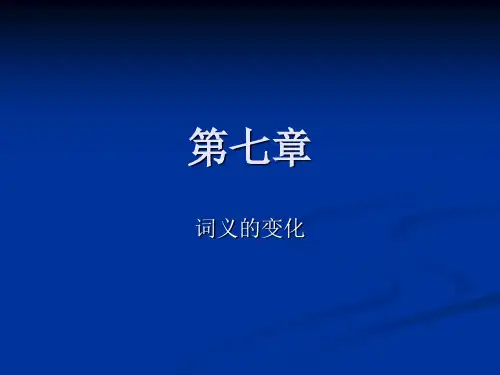

词义变化一)词义的扩大凡是词义从特定的意义扩大为普遍的意义,或者从指"种"的概念扩大为指"类"的概念,结果新义大于旧义,这种演变叫做词义的扩大(the enlarging, widening, extension或expansion of meaning),也叫做词义的一般化(the generalization of meaning)。
以lady一词为例,它以前仅仅指"女主人"。
这个词的词义渐渐扩大了,适用的妇女越来越多,先是指贵族太太,后来指有教养的妇女,例如:The lords and ladies are all gathered in the palace。
现在,lady可以用于指任何"女人",是一种礼貌的用法,尤其是那个女人就在跟前的时候,例如:There is a Japanese lady here, looking for someone who looks like you.在提到老妇人的时候,几乎总是说old lady或elderly lady。
在对一群女士说话的时候也总是说ladies,而不用women,例如:Ladies, could I have your attention, please?Good evening, ladies and dy已经几乎成为woman(女人)的同义词,例如:saleslady(女售货员),cleaning lady(清扫女工),ladies' room(公共女厕所)等等;甚至可以用作定语:a lady novelist(女小说家),lady traffic wardens(女交警),lady guests(女客人)。
词义的扩大不仅限于名词,动词、形容词的词义也都可以扩大。
例如:carry(拿)的原义是"用车运"(transport by cart),跟cart的关系只要看词形就能看出来,现在把by cart这一语义选择限制去掉了,这个词的词义范围也就扩大了。
一)词义的扩大凡是词义从特定的意义扩大为普遍的意义,或者从指"种"的概念扩大为指"类"的概念,结果新义大于旧义,这种演变叫做词义的扩大(the enlarging, widening, extension或expansion of meaning),也叫做词义的一般化(the generalization of meaning)。
以lady一词为例,它以前仅仅指"女主人"。
这个词的词义渐渐扩大了,适用的妇女越来越多,先是指贵族太太,后来指有教养的妇女,例如:The lords and ladies are all gathered in the palace。
现在,lady可以用于指任何"女人",是一种礼貌的用法,尤其是那个女人就在跟前的时候,例如:There is a Japanese lady here, looking for someone who looks like you.在提到老妇人的时候,几乎总是说old lady或elderly lady。
在对一群女士说话的时候也总是说ladies,而不用women,例如:Ladies, could I have your attention, please?Good evening, ladies and dy已经几乎成为woman(女人)的同义词,例如:saleslady(女售货员),cleaning lady(清扫女工),ladies' room(公共女厕所)等等;甚至可以用作定语:a lady novelist(女小说家),lady traffic wardens(女交警),lady guests(女客人)。
词义的扩大不仅限于名词,动词、形容词的词义也都可以扩大。
例如:carry(拿)的原义是"用车运"(transport by cart),跟cart的关系只要看词形就能看出来,现在把by cart这一语义选择限制去掉了,这个词的词义范围也就扩大了。
摘要:本文从英语词义演变发展的过程中,分析了旧有词义内涵延伸和外延扩展的诸多因素。
初步阐述了英语词义的变化对社会发展所产生的积极意义,以及英语词义变化的趋势。
关键词:词义;变化;因素;正如世间万物无时无刻不在变化之中一样,词义的变化是一种必然的历史发展趋势。
在活的语言(a living language)中,词义的变化是十分常见而又非常必要的。
人类社会发展到了一定阶段,就需要对新的概念、新的现象、表达新的事物、新的观点有一个不同于以往的表达形式,而词义变化正是满足人们这种需要的简便方式。
因此,我们今天所使用的每一个词语的意义,与一个世纪以前相比,都略有不同,在更长时间以前,可能有一个更为不同的意义。
一个词的旧有意义的改变或消失,以及新意义的产生是和人类社会、文化、科技、教育的发展和变化有密切关系的,这是词义变化的外因;与此同时,语言自身的变化,人们的心理活动对词义的变化也有一定的影响,本文旨在对英语词义变化的诸多因素和成因做以下简要的探讨。
1、社会的发展是词义变化的历史因素人类社会的不断发展,必然促进各个事物由简到繁,由初级到高级。
伴随事务的发展,表示事物、现象、行为名词的词也必然有所变化,这就是词义变化的历史原因。
表示人们日常生活使用的物品名称的词义往往发生潜在的变化。
例如: paper一词来源于希腊词papyros,是指埃及的一种植物“芦草”。
在古代,这种植物的茎曾用作书写的材料,后来出现了新的书写材料———纸, paper一词的词义就逐渐转向了纸。
book从前是一种数木的名称。
人们曾把这种树剖成薄板,在上面刻字,并将几块薄板联接起来。
随着纸的发明, book一词的词义转向装订成册的书。
doom一词在古英语中表示比较广泛的意义。
“方法、手段、门路”等。
到了乔(Chaucer)时代,表示“Judgment”(最后的见解)。
后来在莎士比亚的戏剧中的词义转为“厄运、劫数、灭亡”,如“查理三世”(RichardⅢ)中的一句:All unavoided isdoom of destiny(所有不可避免的是劫数难逃)。
简述词义的演变
词义的演变是指一个词语在不同的文化、语言、历史背景下,其含义、用法、意义等方面发生变化的过程。
下面是一个示例:
在英语中,单词 "bank" 最初的含义是指河岸。
随着时间的推移,这个词的含义逐渐扩展到指金融或银行业务。
在现代社会中,"bank" 一词通常指银行或金融机构。
另一个例子是单词 "library",这个词最初是指一个收藏书籍的地方,即图书馆。
随着时间的推移,这个词的含义逐渐扩展到指一个收藏各种资料的地方,包括电子书、数字化资源等。
在现代社会中,"library" 一词通常指一个公共或私人机构,提供各种形式的教育资源。
词义的演变是一个复杂的过程,受到许多因素的影响,包括语言、文化、历史、社会等。
随着时间的推移,词语的含义可能会发生变化,以适应新的文化和社会环境。